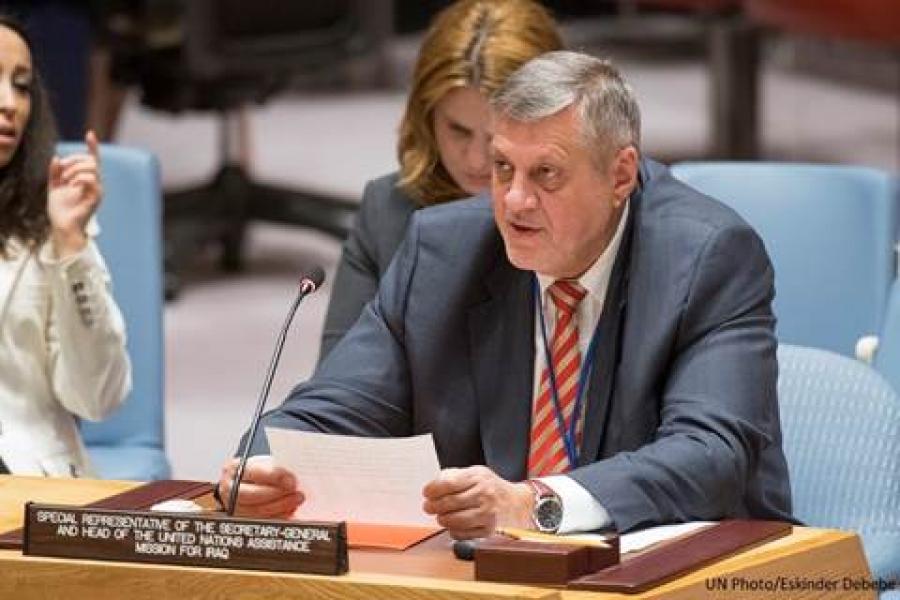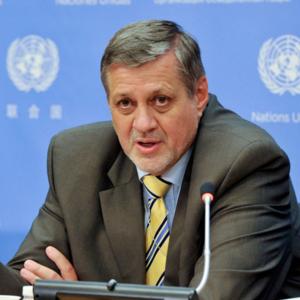Briefing to the Security Council by SRSG for Iraq Ján Kubiš New York, 30 May 2018 [AS DELIVERED] | BTSC
Madame President,
Distinguished members of the Security Council,

On 12 May 2018 – within the constitutional time-frame- Iraq held elections to its national parliament, the Council of Representatives. Prime Minister Haider al-Abadi, after the close of the polls, noted that τhe country held the elections on time, that people were able to cast their votes and select their representatives freely and safely and that the liberated areas witnessed a free voting process for the first time after the victory of the Iraqi forces and the defeat of Da’esh.
The Secretary-General on 13 May congratulated the people of Iraq on the holding of parliamentary elections and stated that following the military defeat of Da'esh, the elections represent further progress in building a stronger Iraqi democracy. He saluted the tireless efforts of electoral officials, party agents and the security forces in making the elections largely peaceful and orderly.
Following the elections, international partners, including the governments of Kuwait, Qatar, Iran, Turkey, United Arab Emirates, United States of America, United Kingdom, and European Union also congratulated the Iraqi people.
Madame President,
The elections held in a generally calm and stable environment were marked by a low voter turnout: the Independent High Electoral Commission (IHEC) informed about the participation of 44.52%, just 10.8 million out of 24.3 million eligible voters, a significant decrease in comparison with previous national elections in Iraq after 2003. The new parliament will also witness a massive turn-over - according to the preliminary results less than 100 of the over 300 incumbent MPs have secured their place in the new Council of Representatives (CoR). The decision by more than half of the voting population not to exercise their democratic right sends a strong signal to the elites ruling the country since 2003. I urge the Iraqi political elites to draw the necessary conclusions on the need for improved representation, justice for all, democratic accountability and good governance void of corruption, sectarian quota system, nepotism and patronage.
I also urge political leaders to ensure the full participation of women in negotiations on the formation of the next ruling coalition and the government, and their representation at the highest levels in Iraq’s political and decision-making structures in the parliament and the government as pledged by many political leaders in the election campaign.
Madame President,
Following the closure of the polls and the announcement of the preliminary results, many Iraqi political leaders publicly endorsed the electoral process including the Prime Minister and the President. They continue to urge a timely conduct and conclusion of the complaint process, certification and acceptance of the results, and speeding-up of the formation of the new government, within the constitutional timeline and in accordance with relevant legal procedures. Some other political forces and leaders have raised concerns over some of the technical shortfalls encountered with the electronic vote tabulation devices, as well as reports of fraud and vote rigging, active intimidation of voters including by some armed formations, and political interference. They have demanded the recount of votes in some governorates, the annulment of results of out of country voting and voting of the IDPs, and even fresh elections. Amidst questions about the legality of their decisions, including from the IHEC, on 28 May the Council of Representatives voted to request the IHEC to undertake the manual counting of 10 per cent of the ballot boxes that could trigger the manual counting of all the ballots in case of a discrepancy of 25 percent and above. It also requested cancellation of the Out of Country and IDP voting.
On 24 May, the Council of Ministers (CoM) decided to form a High Commission to investigate reports and documents pertaining to the elections. The High Commission already referred the IHEC to the Integrity Commission, a move rejected by the IHEC as an interference in its independence.
Six Kurdistani parties have questioned the credibility of the electoral process in the Kurdistan region and have been calling for a recount of the votes in the Kurdistan governorates, and even for the re-run of the elections. On the other hand, the Kurdistan Democratic Party and Patriotic Union of Kurdistan have announced their satisfaction with the outcome of the elections and their intention to start dialogue on coalition building with political parties in Baghdad.
In Kirkuk governorate – one of several hotspots of complaints - the situation remains volatile, with Turkmen and Arab parties, demanding manual recounting of the election results while the IHEC has complained that they have obstructed their work.
On 17 May, I called on the Electoral Commission to act expeditiously and seriously to address all complaints including, as necessary, the conduct of a partial manual recount in selected locations, notably in Kirkuk. I stressed the importance of undertaking such measures in full transparency, witnessed by stakeholders, to strengthen confidence in the process. I also called on all political actors to uphold the peace and to remain committed to resolving any electoral disputes through the established legal channels.
We urge the independent electoral management bodies to adjudicate all appeals properly, fully and in time, to enable corrections of the problems, justice and the timely certification of the final election results. I also wish to highlight the readiness and availability of United Nations electoral advice and expertise, in support of any activities and measures that may be required to retain confidence in the process, also in the light of the forthcoming Provincial Council elections across Iraq on 22 December and Kurdistan Regional elections on 30 September this year.
Given the controversies around the CoR elections, the regional Kurdistan High Electoral and Referendum Commission has decided not to use electronic vote tabulation machines. UNAMI stands ready to advise and support that electoral process.
Madame President,
The post-election phase represents a crucial time for Iraq. Building on the achievements of the current government, we urge political leaders to prioritise inclusive, non-sectarian dialogue, and to ensure the swift formation of a new truly national Government which reflects the will of the people of Iraq. It is essential that the new Government works as one across the sectarian and ethnic divides in pursuing much-needed political, economic and social reforms, based on the principles of patriotism and citizenship with equal rights and responsibilities, justice and opportunity for all and good governance while working to improve the economy, public services delivery and social justice. A new government, based on such an approach, will guarantee the future of Iraq as a stable, prosperous, united, democratic, fully sovereign and independent federal state with good relations with all its neighbours based on mutual respect, non-interference, and common interests as a factor for stability, cooperation and prosperity, also in the region.
Madame President,
The humanitarian crisis in Iraq continues. More than 2.1 million people remain displaced and in need of humanitarian assistance. Funding to provide the most vulnerable with emergency support is, however, at critically low levels. Out of the required US$569 million in the Humanitarian Response Plan, only $101 million in donor contributions (18%) was received as of 15 May. Also, demining and stabilisation efforts are underfunded. I therefore appeal to the donor community to further extend their generosity to the people of Iraq for humanitarian, stabilisation, de-mining and rehabilitation needs.
Madame President,
Despite the Prime Minister’s 2017 directive on the civilian character of camps, a continued military presence in camps across Iraq, the sexual harassment of women and girls, diversion of humanitarian assistance, detention and disappearance of their residents, recruitment activities inside the camps and armed actors’ attacks on humanitarian staff, remain deeply concerning
In April, Amnesty International issued a report which concluded that Iraqi women and children with perceived ties to Da’esh experience serious protection issues in camps, including denial of assistance; restrictions on freedom of movement; and sexual harassment, rape and sexual exploitation. I wish to underline that the UN in Iraq in cooperation with the government has been engaged, notably through the Protection from Sexual Exploitation and Abuse Network established in 2016, in an urgent follow-up on reported situations.
Madame President,
As concerns the issue of missing Kuwaiti and third-country nationals and missing Kuwaiti property, in April, for the second time in 15 years, Iraq hosted meetings of the Tripartite mechanism, demonstrating its commitment to the missing persons file and a steady return to normality.
I am grateful for the positive response received towards the proposals tabled by UNAMI during these meetings, namely a pilot project to conduct mass grave site surveys in Iraq with the help of the UN Global Service Centre in Brindisi.
I would like to call upon the Member States in possession of relevant satellite imagery from 1990-1991 to come forward and provide analysis and information to the Government of Iraq that could assist in identification of burial locations.
The missing Kuwaiti property file has also not registered any direct progress during this period. UNAMI has been meeting with the Iraqi Ministry of Foreign Affairs to discuss how best we can support and facilitate the repatriation of already located Kuwaiti property, which has been pending for over a year.
Thank you for your attention.
Speech by


